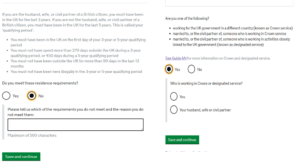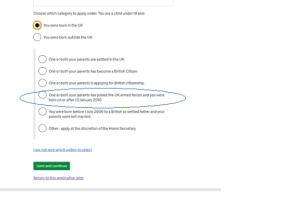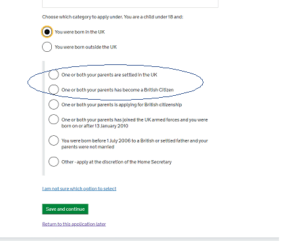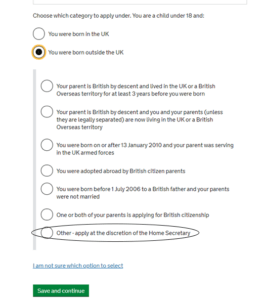Contents
- 01 The guide to becoming a British Citizen
- 02 Main requirements for spouses and soldiers
- 03 Commonwealth soldiers
- 04 Gurkha soldiers
- 05 Spouses (except spouses on EU settlement scheme)
- 06 EEA spouses and Irish Citizens
- 07 Children
- 08 BN(O) passport holders
- 09 Dual Nationality
- 10 Crown Service Applications
- 11 Contact Information
01 The guide to becoming a British Citizen
UKVI have updated their guidance, it now includes a step-by-step guide to the process and clear explanations of the requirements. See gov.uk/government/publications/form-an-guidance
Back to top02 Main requirements for spouses and soldiers
Back to topSoldiers
During Service, soldiers are exempt from immigration control under section 8(4)(a) of the Immigration Act 1971. This exemption means that you can apply for Citizenship without first requiring indefinite leave/settlement. However, as soon you discharge, you are no longer exempt and will need to apply for ILR before you can apply for Citizenship.
Spouses
Spouses will need indefinite leave (or settlement under the EU settlement scheme) in all cases before you can apply for Citizenship.
DO NOT make an application for Citizenship if you don’t have ILR/settlement as the application will be refused and you could become an overstayer.
Spouses making standard applications need to have held their ILR for 12 months. Spouses married to British Citizens just need to have ILR, they do not need to wait. Refer to the relevant sections on this website for information on how to gain ILR/settlement.
IMPORTANT – from 5 November 2015 you won’t be able to use ESOL qualifications as proof that you meet the KoLL requirement. Only qualifications on the UKVI SELT (Secure English Language Tests) list taken at an approved centre will be accepted, see below.
You can demonstrate your knowledge of language and life in the UK by:
- Passing the Life in the UK test,
and either - having a recognised English test qualification from an approved test centre. You can’t use other qualifications, eg GCSEs, A levels or National Vocational Qualifications (NVQs). Functional Skills qualifications taken during Service can also not be used.
or - being a national of an English-speaking country
or - Having a degree (or post-graduate degree) which was taught in English. Only post-graduate diplomas will be accepted. GCSE’s and A-Levels are not accepted. You can also find out what evidence you need to provide at that link.
There is also more information about this in Booklet AN page 21 onwards.
What happens if my qualification has run out?
Some recognised test qualifications only last for 2 years. However you can still use a B1 level qualification that’s run out if you’re applying for citizenship and it was accepted when you applied to settle in the UK. It doesn’t matter if the B1 level test you took isn’t on the list of recognised tests now. You don’t need to take another test. Unfortunately as most soldiers don’t need to apply for ILR, this won’t apply. However it may apply to some spouses who had to have a B1 qualification to apply for ILR.
You should read the guidance at GOV.UK: Guidance Form AN carefully – page 25 onwards. More detailed information can be found at GOV.UK: Good character: caseworker guidance.
The following convictions will usually prevent you from applying for Citizenship. You have to declare all convictions regardless of the date. If you have been charged with a criminal offence and are awaiting trial or sentencing, you are advised not to make any application for registration until the outcome is known.
This is just a summary – you are advised to read the guidance above for further information.
- A custodial conviction* of 4 years or more
- A custodial conviction of 12 months to 4 years (unless 15 years has passed since the end of the sentence)
- A custodial conviction of less than 12 months (unless10 years has passed since the end of the sentence)
- A non-custodial conviction** within 3 years of the date of application
*Custodial convictions include time spent in MCTC
** non-custodial convictions include summary hearings/courts martial and any court-imposed fine (e.g. for speeding, assault or drink-driving). They do not include fixed penalty fines. They do include cautions and suspended sentences.
Is my military conviction the same as a criminal conviction?
Guidance has been published, which should make it much clearer to work out whether your conviction in a military court (whether a summary hearing or court martial) is considered to be criminal or disciplinary and how it will affect an application for citizenship.
You should read the guidance at GOV.UK: HM forces – criminality: caseworker guidance carefully.
If you are still unsure about your conviction, then you should speak to your chain of command (platoon officer or OC, discipline clerk or RAWO).
Family members
Changes which came into effect on 28 June 2022 now mean that any period of overstaying during your 5 (or 3) year qualifying period will no longer affect your application if you are a family member. This is as long as no concerns about your character have arisen since your grant of settlement.
Serving personnel
The change above only applies to people with indefinite leave. As serving personnel are ‘exempt from immigration control’ they are not considered to have indefinite leave and therefore the lawful residence requirement would still form part of their good character assessment in any application for Citizenship. We have discussed this with Nationality caseworkers who stressed that overstaying during the early parts of the residence requirement will not necessarily mean that an application will automatically be refused. This is because caseworkers are able to use discretion when considering nationality applications. The duration of the time without leave, the circumstances around how that period of unlawful residence occurred, as well as the length of Service since that gap in leave would all be taken into account in the consideration. If you were an overstayer prior to enlisting you should contact the F&C team for further advice.
Other immigration breaches
Other immigration breaches, such as illegal working or accessing public funds when you have no entitlement could lead to a refusal if the breach took place within the previous 10 years (before the date of decision).
The guidance booklet – GOV.UK: Nationality: good character requirement details other reasons why you may not meet the good character requirement. These include:
- NHS debt of £500 or more
- Bankruptcy
- Deception
You are advised to read the booklet to ensure your application will be successful.
Soldiers – soldiers applying on form AN are not required to show that they were in the UK at the start of the 5 year qualifying period. If you were serving overseas or were on training/deployment on the first day this will be treated as though you were in the UK.
IMPORTANT: This discretion does not apply to BN(O) passport holders applying on form B(OTA). It also does not apply if you were out of the UK on a non-work related trip.
Spouses – still need to meet this requirement.
- If you are making a standard application then you must have been in the UK at the start of the 5 year residential requirement. The qualifying period starts 5 years before your application is received by UK. So for example if your application is received by UKVI on 1st December 2021, they will count the start of the 5 year qualifying period as the 2nd December 2016 and will look to see that you were in the UK then.
- If you are applying as the spouse of a British Citizen you must have been in the UK at the start of the 3 year residential requirement. The qualifying period starts 3 years before your application is received by UK. So for example, if your application is received by UKVI on 1st December 2021, they will count the start of the 3 year qualifying period as the 2nd December 2018 and will look to see if you were in the UK then.
- Although you can count all time spent overseas AFTER the first day as residence in the UK, you need to have been in the UK on this first date. If you were on an overseas assignment, your application will be refused.
If you are currently on an overseas assignment and the soldier is already British then you may be able to make an application under the Crown Service rules which do not require you to have been in the UK on the 1st day. See below for further information.
Soldiers and spouses applying on the ‘standard route’
- Will need to have lived in UK or on overseas assignments for 5 years
- Time spent in the UK prior to enlisting will count
- Should not have spent more than 450 days outside the UK during the 5 years (unless it is service related absences)
- Should not have spent more than 90 days outside of the UK in the past 12 months (unless it is service related)
Spouses married to British Citizens
- Will need to have lived in UK or on overseas assignments for 3 years
- Should not have spent more than 270 days outside of the UK during the 3 years (unless it is service related absences)
- Should not have spent more than 90 days outside of the UK in the past 12 months (unless it is service related)
In a change to published guidance, UKVI has now reviewed their policy which previously prevented spouses of Gurkha soldiers from gaining Citizenship. Spouses are now able to apply for Citizenship even if the soldier is not British. Spouses must meet all requirements above, including the requirement to hold indefinite leave, the 5 year residential requirement and the ‘first day’ requirement. Overseas assignments will count as residence in the UK. Please contact the F&C team if you are unsure of your eligibility.
03 Commonwealth soldiers
See below for a summary of the requirements that soldiers have to meet, for further detail refer to the Main Requirements section above. See gov.uk/apply-citizenship-indefinite-leave-to-remain/how-to-apply for the link to apply online.
- CAN apply for citizenship whilst serving as long as you have lived in UK (or on overseas assignments) for five years. When completing the online form you should write down all of your trips outside the UK – under ‘reason for trip’ you should write ‘Crown Service’ (unless you went outside the UK for non-Service reasons).
- If you have spent more than 450 days out of the UK on overseas assignment complete the form as follows. In the box write I do not meet the residence requirements because I have spent more than 450 days outside the UK due to Armed Forces Service. I have provided a letter which confirms this.

- CAN count any time spent in the UK prior to joining the Army. This includes time spent on visit visas
- DO have to have served for a minimum of 12 months prior to applying
- DO have to include a unit letter to confirm date of enlistment and that time spent overseas was due to military Service.
- DO NOT need ILR first. When you complete the online form select the following option and put in your date of enlistment

- DO have to meet the Knowledge of Language and Life requirement (KoLL), regardless of how long they may have served for (refer to the main requirements section above). If you have an English language qualification which has expired you won’t be able to use it as you won’t have used it in a previous application.
- DO NOT have to meet the requirement to have been in the UK on the first day of the five-year residential qualifying period
- DO have to meet the good character requirement. Please refer to the ‘main requirements’ section above
- DO have to pay the fee
- DO NOT have to send your passport in, a scan of your passport can be sent in along with the other supporting documents
04 Gurkha soldiers
Gurkhas are not included in the above policy as they remain Nepalese citizens whilst serving with the Brigade.
Gurkhas seeking British citizenship may do so either by transferring to the wider Army after five years’ Service, or after discharge by initially applying for settlement and then naturalisation.
Once they have ILR, they can apply for Citizenship immediately if they meet the other main requirements. There is no requirement to wait for 12 months prior to applying.
Back to top05 Spouses (except spouses on EU settlement scheme)
There are two ways to become a British citizen if you are married to a soldier. In both cases, you need to have ILR first. There are no discretions in place for spouses of soldiers when applying for Citizenship except that outlined in the section on residence requirements above.
Back to topSee GOV.UK: Apply for citizenship if you have indefinite leave to remain or ‘settled status’:
- ILR for 12 months
- Five years’ resident in UK (or on overseas assignments)
- See ‘Main Requirements’ above
Spouse of British citizen soldier:
- ILR
- Three years’ resident in UK (or on overseas assignments)
- See ‘Main Requirements’ above
Completing the online form – if you have spent more than 450/270 days out of the UK because you were accompanying the soldier on an overseas assignment complete the form as below. In the box write I do not meet the residence requirements because I have spent more than 450/270 days outside the UK due to Armed Forces Service. I have provided a letter which confirms this.
You will need to provide a letter or some evidence which confirms the time you spent out of the UK was on assignment.

06 EEA spouses and Irish Citizens
You will need to meet all of the other requirements under the main requirements section above.
You will need ILR (known as settled status) issued under the EU settlement scheme (EUSS). If you are applying on the standard route you will need to have held this for 12 months.
You will normally meet the lawful residence requirement by supplying evidence of your settled status, so you will not need to supply evidence of what you were doing prior to being granted settled status. You are also no longer required to show that you held Comprehensive Sickness Insurance (CSI).
Irish citizens are considered settled from their date of arrival in the UK, meaning they are free from immigration time restrictions for naturalisation purposes without having to hold leave under the immigration rules. If you are an Irish national you will have been in the UK lawfully during the 5 year qualifying period.
Please get in touch if you are unsure of your eligibility to apply.
Back to top07 Children
The rules regarding a child’s eligibility for Citizenship are complex. The following scenarios cover most of the cases that the F&C team come across. If your case is not covered by the examples below then please get in touch with us at fcsupport@aff.org.uk
Back to top- Any child born legitimately in the UK to a parent who is in the Armed Forces is automatically a British Citizen. See MN1: Registration as a British citizen A guide about the registration of children under 18 – page 7
- To get a passport you will just need to make a normal application, though it may be advisable to include a letter from the soldier’s unit confirming the soldier’s employment and date of enlistment.
- It is not advisable to use a post office checking service as they will probably tell you your child is not eligible.
If a child is born in a British Overseas Territory (other than the Sovereign Base Areas of Akrotiri and Dhekelia), after 21 May 2002, and one of the parents is a British Citizen or is settled at the time of the birth, the child will be born British.
Information about this can be found on page 8 of the guide MN1.
- If the child is born during an overseas assignment to British parents then the child will have full British Citizenship and can pass his/her Citizenship onto any children they have which are born overseas.
- If the child is not born during an overseas assignment, the child will not have full Citizenship, he/she will be a British Citizen by descent only. Children born to parents who are British by descent have no automatic claim to British citizenship.
Children born after 13 Jan 2010: Children in these circumstances are eligible to be registered as a British Citizen under section 1(3A) of the British Nationality Act. They are not eligible for a British Passport until they have been registered. Select the relevant category highlighted below on the online form:

Children born before 13 Jan 2010: Eligible to be registered under section 1(3). Select the relevant category highlighted below on the online form:

Apply on form MN1.
Complete the application at GOV.UK: Apply to register as a British citizen: Form UKF.
All children of F&C personnel born outside the UK while their parent was/is on assignment are eligible to apply to be registered as British Citizens.
– If your child was born overseas after 13 January 2010 you need to select the option below on the form MN1.

– If your child was born overseas before 13 January 2010 you need to select the option below on the online form. It is also advisable to send the following document in with the application, see Nationality Notice 12/10.

– Your child will not be eligible for a British Passport until they have been registered as a British Citizen
– You will need to include a letter from the unit to confirm that the soldier was serving overseas at the time of birth, the date and place of birth of the child and the date and place of recruitment of the soldier.
– As of 1 April 2015 children born to non-British parents serving on an overseas assignment can be registered as British at public expense. For further information refer to 2015DIN01-130 ‘Family Migration Rules for UK Armed Forces family members who are Non-British’
*Please note: the child’s mother does not have to have been accompanying the soldier on the overseas assignment in order to be eligible to register. If the child was born in Ghana for example whilst the soldier was in Germany, he/she would also be eligible to register. However, if the child was born in Ghana whilst the soldier was serving in the UK, then it would not be eligible to register!
Most applications will be considered under section 3(1) of the British Nationality Act and registration will be at UKVIs discretion. For a list of criteria that are used to assess such applications, read page 27 onwards of the following caseworker guidance GOV.UK: Registration as a British citizen: children.
Main requirements:
- The child has ILR. The guidance for caseworkers above says ‘you should normally only register a child under section 3(1) who has not been granted ILR or permanent residence where there are strong compelling compassionate circumstances to do so.’
- One parent should be a British citizen and the other should be settled or a British citizen (where the British citizen parent is the spouse, it is not necessary for the soldier to also be a British citizen as the exempt stamp acts as ILR). Parents with sole responsibility can apply once they are British themselves
- The child is of ‘good character’ if aged over 10.
- If the child is over 13 they have lived in the UK for at least 2 years (unless they were on an accompanied overseas assignment)
Complete the form MN1 and select the following option:

08 BN(O) passport holders
2 options:
- Form B(OTA)
- 5 years resident in UK
- Must have been physically in the UK on the first day of the 5 year period (any time overseas due to Crown Service after then can be counted as residence)
- Have ILR for 12 months or an exempt stamp
- You do not need to meet the KoLL requirement
- See gov.uk/government/publications/form-bota-guidance for guidance
- Form B(OS)
- Only available if you have evidence of no other nationality
- Not full citizenship
- No residential requirement or requirement to have ILR
- See gov.uk/government/publications/form-bos-guidance for guidance
09 Dual Nationality
See gov.uk/dual-citizenship for all information.
Back to top10 Crown Service Applications
If you are currently on an overseas assignment and wish to apply for Citizenship, please see aff.org.uk/advice/foreign-commonwealth/overseas-assignments-for-fc-families/#citizenship-applications-during-an-overseas-assignment
Back to top11 Contact Information
See gov.uk/contact-ukvi/british-citizenship-and-nationality for information on how to contact UKVI regarding Citizenship applications.
To request your documents to be returned: www.gov.uk/visa-documents-returned